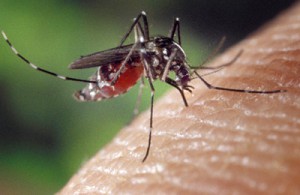Mosquitos: They are the scourge of summer activities—the annoying buzzing noise as they fly around our ears and the pain, itching and swelling associated with their bites. Worst of all, certain species of mosquitoes can transmit diseases such as West Nile virus, Dengue fever and malaria. Defense mechanisms such as mosquito repellent, covering my head with netting and wearing heavy clothing are often insufficient against the swarm of hungry insects. It’s enough to make me want to stay indoors.
Those people who cannot escape these pests have a higher risk of being bitten and contracting a disease such as malaria, which killed an estimated 627,000 people in 2012, mostly in Africa and southeast Asia (1). A common step in malaria reduction programs in high-risk areas is reducing the number of Anopheles gambiae mosquitoes, which act as the host for malaria-causing parasites. This often involves massive amounts of insecticides, including limited amounts of the much maligned but very effective insecticide dichlorodiphenyltrichloroethane (DDT). Due to these programs, the World Health Organization (WHO) estimates that between 2000 and 2012, malaria mortality rates decreased by 42% worldwide, including a 48% decrease in children under 5 years of age. Clearly these programs are saving lives, but wouldn’t it be nice to achieve the same thing with fewer pesticides?
Continue reading “Genetically Modified Mosquitoes Fight Malaria”
